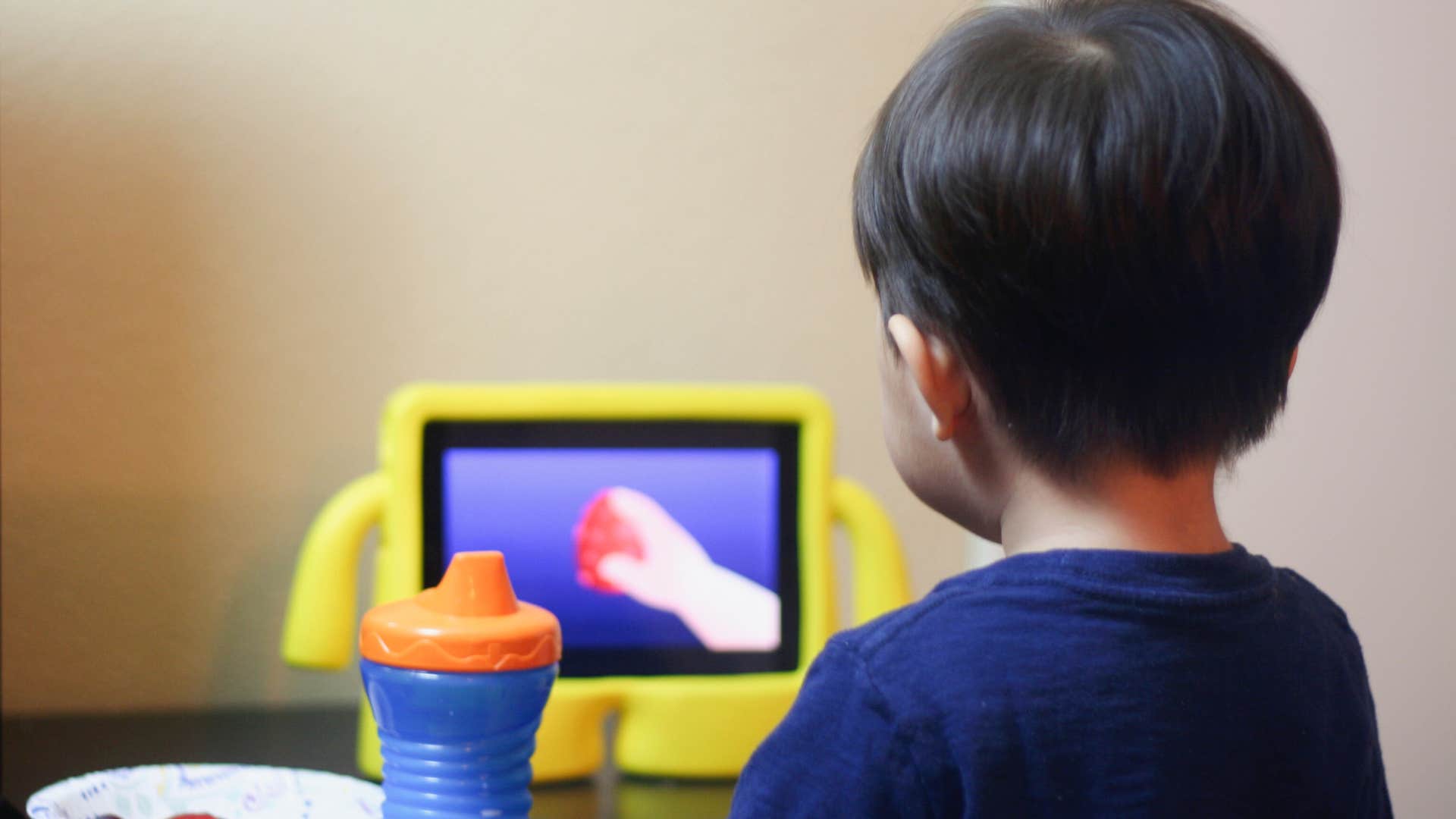Parents Who Raised Gen Z Kids Are Finally Starting To Have These 11 Regrets
We gave them everything we never had, and this is how that turned out.
 Krakenimages.com | Shutterstock
Krakenimages.com | Shutterstock Generation Z was born between 1997 and 2012. They are digitally fluent, accustomed to diversity, and take more of a pragmatic approach to life than their predecessors. But as they enter adulthood, parents who raised Gen Z kids are finally starting to have some specific regrets.
Gen Z was raised on social consciousness and given an entrepreneurial spirit by way of the nurturing they likely received from their Gen X and millennial caregivers. With each new generation, there are advances and changes to how they interact with the world. As a parent, you do the best you can with what you know and hope for the best outcomes for your children, but even then, as they grow older, there are some things most parents wish they had done differently.
Parents who raised Gen Z kids are finally starting to have these 11 regrets
1. Not sending them outside
 cottonbro studio from Pexels via Canva
cottonbro studio from Pexels via Canva
One of my fondest childhood memories is getting home from school and rushing through my chores and homework so I could go outside and hang with my friends. Summers were a never-ending outdoor adventure for all of the kids in the neighborhood. That was where we built organic relationships and found some of the people we would know for the rest of our lives. Times were simple, and connecting was easy.
As the world has advanced technologically, Gen Z has caught on quickly, learning to use social media and other platforms to talk to people and make connections. Gone are the days when they might go play and be social. I noticed a big disconnect between how my teens act when behind a screen versus in person. They would seem awkward and out of their element in real life. Those times outside are key in developing healthy social skills.
2. Allowing them way too much screen time
 gradyreese from Getty Images Signature via Canva
gradyreese from Getty Images Signature via Canva
Smartphones, tablets, and other devices came through at a time when parents were working, cooking, cleaning, and chauffeuring kids around. They acted as a babysitter when we just needed a moment to ourselves or time to finish a project. They appeased crying little ones when we were at our wits' end. At first, they seemed like a gift, giving us the time we needed while the kids were otherwise occupied.
But what we didn't know was how addictive these things can be. Our kids became accustomed to instant gratification and always having some form of stimulation to keep them from being "bored". Now, instead of us hoping for a moment of quiet, we hope to get a cognizant response while they are engaged on their devices. Studies have shown clearly that constant screen exposure could be bad for mental health, sleep, attention span, and social development.
3. Not teaching digital boundaries early on
 Mary Smith from Getty Images via Canva
Mary Smith from Getty Images via Canva
The internet is a scary place, especially for children. It didn't initially cross our minds that giving our kids access to this technology would increase their risk of being victimized. Because we are normal, healthy people, it's hard to fathom that there are weirdos sitting online with the express intent of finding young people to take advantage of. But that is the stark reality we all face.
Had we known from the start, we would have given our Gen Zers a crash course in safety and likely monitored their activities much more closely than we did. Thank goodness we are all becoming more aware of the evils lurking out here in the world and passing that knowledge along to our offspring so they know how to protect themselves.
4. Being too overprotective
 Yuganov Konstantin via Canva
Yuganov Konstantin via Canva
I am the first to admit that my 14 and 16-year-old sons are very sheltered and overprotected. Through life experience, we parents realize just how dangerous the world is and want to make sure our kids don't get caught up. We don't let them learn by experience the way we had to because we want to avoid much of the trauma we experienced.
But failing is a part of life. Taking losses and bouncing back is how people build resilience and tenacity. They learn independence and problem-solving by overcoming obstacles. Had we known better, we would have realized that it's okay to let our children take a fall as long as we encourage them to get back up. There are things you just can't teach, and our kids need to go on their own journey to learn life's lessons.
5. Not fully understanding the importance of mental health
 fizkes by Getty Images via canva
fizkes by Getty Images via canva
As time has progressed, the importance of mental health has become a big topic, but when we were raising Gen Z, we were left to solve any mental, emotional, or behavioral issues on our own. Conditions that are medically named now were labeled as lazy, inattentive, or just plain bad.
With mental health no longer being a taboo subject, it is clear that if we knew then what we know now, we would have done a better job of identifying our children's individual needs and getting them the support they needed. We were used to managing our emotions internally, not realizing the damage it was doing. But now that we know better, it's not too late to make sure your child is mentally healthy.
6. Skipping difficult conversations
 Kindel Media from Pexels via Canva
Kindel Media from Pexels via Canva
Some topics are hard to handle. Intimacy, race, politics, and mental health are just a few of the topics where we may have struggled with finding the right words to address our children with. Now we know that it was absolutely necessary to talk about these things before they got out into the world and were influenced by others.
Difficult conversations are growth opportunities for both parents and children. Being able to talk openly and transparently with our kids can prepare them to navigate a complicated world. We came from a generation that didn't talk about these things, so never modeled it, leaving us to figure it out on our own, so we passed it along.
7. Putting too much focus on achievement
 South_agency from Getty Images Signature via Canva
South_agency from Getty Images Signature via Canva
Parents who raised Gen Z kids came up under the assumption that "If you're not first, you're last." We knew the value of hard work and wanted desperately for our children to live up to our wildest dreams and theirs. So, we over-scheduled their lives, putting them in recreational sports, clubs, programs, and anything we thought would help make them successful adults.
But we never stopped to think about the impact on the children, or even if we did, we thought it must be a positive one. Valuing grades, college admissions, excelling in sports, popularity, or extracurriculars over happiness and character development left us with children whose self-worth is directly tied to external success.
8. Not modeling healthy tech use and moderation
 Kaboompics from Pexels via Canva
Kaboompics from Pexels via Canva
It wasn't just our children who were enamored with all of the new technology and gadgets that came out. We, as adults, enjoyed the conveniences that we never had as children. We could connect to people without ever leaving home. We no longer had to sit by ourselves and think things through. We could ask Google about anything we needed in life. Slowly, we became hyper-dependent on devices and social media to make us feel good and make our lives convenient.
It's no wonder Generation Z took that dependency to the next level. They saw us on the phone all day and thought it was the norm. We couldn't get through a movie without checking email or scrolling social media, and they were watching. Kids often mirror their parents' behaviors and we unintentionally normalized poor tech habits.
9. Not understanding the Gen Z culture
 Alex Green from Pexels via Canva
Alex Green from Pexels via Canva
Parents have to constantly adapt to changing times. It's important that we be aware of cultural shifts and what young people are up to. Failing to do so will keep you out of the loop and create a disconnect and a lack of common ground between you and your children. When we raised them, many of us assumed their worldview would align with ours simply because we birthed them or raised them.
But we severely underestimated the impact of evolving views on identity, inclusivity, and global awareness. We unintentionally created a "my way or the highway" environment that didn't allow our children to speak or act freely and didn’t give them a safe space for dialogue. As our understanding grows, we can learn to communicate them with an open mind.
10. Failing to teach financial literacy
 studioroman via Canva
studioroman via Canva
As parents of Gen Z children, we told them that they could do or be anything they wanted in this world. Social media gave them examples of people who made a ton of money in unconventional ways. Gen Z people realized that college and a job might not be for everyone and that they had other ways of becoming wealthy.
But while teaching them about all of their options for getting money, we neglected to equally focus on keeping it. Now, we have a generation of young people who don't know how to retain the wealth they accumulate. Not teaching them budgeting, saving, the reality of student debt, and the cost of living has them facing a tough economic reality that we could have better prepared them for.
11. Not allowing them to fail
 kate_sept2004 from Getty Images Signature via canva
kate_sept2004 from Getty Images Signature via canva
We talked a little bit about this in the "overprotective" section, but it can't be illustrated enough that most of what we learn in life is through trial and error. In a moment of utter failure, we learn the most about who we are and what we are made of. We can analyze what worked, what didn't work, and what we could do better in the future.
If we had just let our kids fail more, they would crash out less when they don't get the intended results. They would fail forward, picking up silver linings through life's losses and using them to keep moving ahead. Of course, no parent wants to see their child sad, disappointed, or hurt. But those are normal feelings, and if you don't learn to deal with them as a child, you will be hell on wheels as an adult.
NyRee Ausler is a writer from Seattle, Washington, and the author of seven books. She focuses on lifestyle and human interest stories that delivers informative and actionable guidance on interpersonal relationships, enlightenment, and self-discovery.

